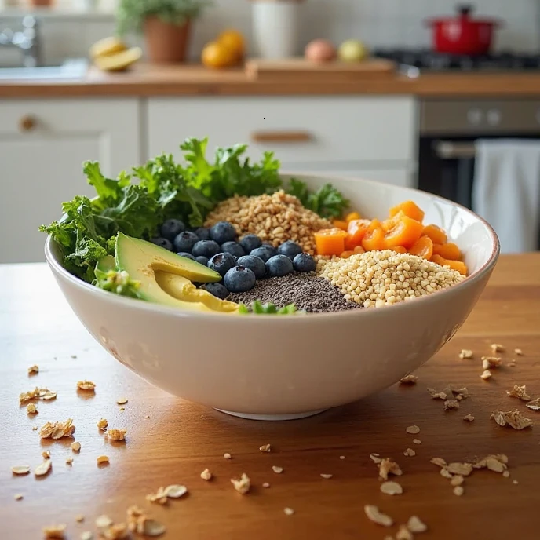
Best breakfast for weight loss. When it comes to shedding pounds and maintaining a healthy lifestyle, breakfast can either make or break your progress. The phrase “breakfast is the most important meal of the day” holds especially true when you’re trying to lose weight. A well-balanced morning meal can kick-start your metabolism, curb cravings, and set a healthy tone for the day. But what exactly is the best breakfast for weight loss? Let’s break it down.
Why Breakfast Matters for Weight Loss
Skipping breakfast might seem like a good way to cut calories, but research shows the opposite. When you skip your morning meal, you’re more likely to experience mid-morning hunger, energy crashes, and overeating later in the day. A healthy breakfast can:
- Jump-start your metabolism
- Reduce hunger throughout the day
- Improve concentration and focus
- Help regulate blood sugar levels
- Provide essential nutrients
The key is choosing the right foods — not just any breakfast will do.
Characteristics of the Best Weight Loss Breakfast
To build a breakfast that supports weight loss, it should include the following components:
- High Protein: Protein helps keep you full, supports lean muscle, and reduces cravings.
- Healthy Fats: Good fats stabilize blood sugar and provide lasting energy.
- Fiber-Rich Carbohydrates: Whole grains, fruits, and vegetables provide fiber, which aids digestion and prolongs satiety.
- Low Added Sugar: Avoid sugary cereals, pastries, and flavored yogurts that spike insulin and promote fat storage.
Top Breakfast Foods for Weight Loss
Here are some science-backed foods and meals that are ideal for a weight loss-friendly breakfast.
1. Oatmeal
Oatmeal is a fiber-rich, slow-digesting carbohydrate that can help you feel full for hours. It’s rich in beta-glucan, a type of soluble fiber that’s been linked to lower cholesterol and improved blood sugar control.
Best Combo:
- ½ cup rolled oats
- 1 tbsp chia seeds
- ½ sliced banana
- Dash of cinnamon
- Almond or oat milk
Avoid pre-flavored packets — they’re often loaded with sugar.
2. Greek Yogurt and Berries
Greek yogurt is packed with protein (about 20g per cup) and low in sugar, especially the plain variety. Pair it with berries for fiber and antioxidants.
Best Combo:
- ¾ cup plain Greek yogurt
- ½ cup blueberries or raspberries
- 1 tbsp ground flaxseed
- Optional: Drizzle of raw honey
This combination supports digestion, keeps you full, and satisfies your sweet tooth naturally.
3. Avocado Toast with Egg
Whole grain toast topped with smashed avocado and a poached or boiled egg is a perfect balance of fiber, healthy fat, and protein.
Why it works:
- The fiber in whole grain bread and avocado keeps you full
- Eggs are highly satiating and rich in nutrients like choline
- Healthy fats promote metabolic health
Add a sprinkle of chili flakes or lemon juice for flavor without added calories.
4. Smoothie with Protein and Greens
Smoothies are a quick, customizable breakfast option — just be careful with sugar from fruits and juices.
Best Ingredients:
- 1 scoop of protein powder (plant-based or whey)
- 1 cup spinach or kale
- ½ banana or ¼ avocado
- 1 tbsp chia or hemp seeds
- Unsweetened almond milk
This nutrient-dense option is filling and ideal if you’re on the go.
5. Cottage Cheese with Fruit and Nuts
Cottage cheese is another high-protein food that can help you lose fat while preserving lean muscle.
Sample combo:
- ½ cup low-fat cottage cheese
- A handful of berries or sliced apple
- 1 tbsp walnuts or almonds
It’s a perfect blend of macronutrients and easy to prepare.
Sample 7-Day Breakfast Meal Plan for Weight Loss
| Day | Breakfast Idea |
|---|---|
| Monday | Greek yogurt, berries, flaxseed |
| Tuesday | Scrambled eggs with spinach on whole grain toast |
| Wednesday | Protein smoothie with greens and almond butter |
| Thursday | Oatmeal with banana and chia seeds |
| Friday | Cottage cheese with pineapple and almonds |
| Saturday | Avocado toast with poached egg |
| Sunday | Veggie omelet with a side of sliced tomatoes |
Foods to Avoid in a Weight Loss Breakfast
Even healthy-sounding foods can be weight loss pitfalls. Watch out for:
- Sugary cereals: Many are loaded with added sugar and low in protein
- White bread or bagels: Quickly digested and offer little fiber
- Flavored yogurts: Often contain more sugar than a dessert
- Breakfast pastries (muffins, donuts): High in refined carbs and fat
- Fruit juices: Lack fiber and spike blood sugar
If your breakfast leads to a mid-morning crash or hunger pang, it’s time to rethink your choices.
Tips to Maximize Weight Loss Benefits from Breakfast
- Eat within 1–2 hours of waking: This helps kickstart metabolism.
- Stay hydrated: A glass of water before eating can aid digestion.
- Plan ahead: Prepping overnight oats or smoothie packs can help you stay consistent.
- Avoid distractions while eating: Mindful eating reduces overeating.
- Include a variety of nutrients: Rotate your ingredients to cover all micronutrient needs.
Final Thoughts
The best breakfast for weight loss is one that keeps you full, nourished, and energized without excess calories. Focus on protein, fiber, and healthy fats while minimizing added sugars and refined carbs. With a little planning and creativity, your morning meal can become a powerful tool in your weight loss journey.
Start your day strong — because a smart breakfast isn’t just good for your waistline, it’s great for your whole body.
References
- Leidy, H. J., et al. (2015).
The role of breakfast in energy balance and health: definition and criteria for a quality breakfast.
American Journal of Clinical Nutrition, 101(3), 540S–548S.
https://doi.org/10.3945/ajcn.114.083402 - Dhurandhar, E. J., et al. (2014).
The effectiveness of breakfast recommendations on weight loss: a randomized controlled trial.
American Journal of Clinical Nutrition, 100(2), 507–513.
https://doi.org/10.3945/ajcn.114.090803 - Clayton, D. J., et al. (2016).
Effect of breakfast omission on energy intake and physical activity in healthy individuals.
American Journal of Clinical Nutrition, 103(2), 529–536.
https://doi.org/10.3945/ajcn.115.119370 - Zhu, Y., & Hollis, J. H. (2013).
Increasing the number of chews before swallowing reduces meal size in normal-weight, overweight, and obese adults.
Journal of the Academy of Nutrition and Dietetics, 113(10), 1215–1221.
https://doi.org/10.1016/j.jand.2013.05.002 - Paddon-Jones, D., et al. (2008).
Protein and healthy aging.
The American Journal of Clinical Nutrition, 87(5), 1562S–1566S.
https://doi.org/10.1093/ajcn/87.5.1562S - Slavin, J. L. (2005).
Dietary fiber and body weight.
Nutrition, 21(3), 411–418.
https://doi.org/10.1016/j.nut.2004.08.018 - Astrup, A., et al. (2008).
The role of protein in weight loss and maintenance.
The American Journal of Clinical Nutrition, 87(5), 1558S–1561S.
https://doi.org/10.1093/ajcn/87.5.1558S - Rein, M. J., et al. (2013).
Polyphenol compounds in berries: Implications for human health.
Nutrition Reviews, 71(1), 1–15.
https://doi.org/10.1111/j.1753-4887.2012.00548.x - Jakubowicz, D., et al. (2013).
High caloric intake at breakfast vs. dinner differentially influences weight loss of overweight and obese women.
Obesity (Silver Spring), 21(12), 2504–2512.
https://doi.org/10.1002/oby.20460 - Harvard T.H. Chan School of Public Health.
The Nutrition Source: The best foods for weight loss.
https://www.hsph.harvard.edu/nutritionsource/healthy-weight/diet-reviews/




